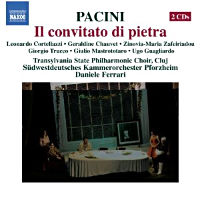
What do opera composers do on vacation? If the researches behind this performance
at the Rossini in Wildbad Festival are correct, they gather their nearest and dearest and dash them off a quickie opera for performance en famille. That, in any case, is what Giovanni Pacini did during down-time between presenting seventy-odd operas to the world; one such family occasion being Il Convitato di Pietro, a merry take on the familiar tale.
I’ve seen four other operatic treatments of the story, and read three different plays about Don Juan and his awkward dinner guest. (“My God! was it tonight? I feel like a fool. I could just die. Look, can we make it next week, same time? Don’t bring anything. It’ll be just us.”) It is clear from many lines in the libretto that Pacini knew those other versions of the opera, too—Mozart/da Ponte’s and Gazzaniga/Bertati’s, anyway.
Pacini (1796-1867) was one of the composers born and raised in Rossini’s shadow, the guys who created the bel canto form that Verdi would transform after them. Pacini was perhaps the most facile melodist of the lot (so regarded by Rossini himself), especially renowned for his cabalettas and concertati, but also for his carelessness and his casual attitude towards bad libretti—where Donizetti and Verdi demanded more careful work, Pacini simply set whatever words were put before him.
For this reason, perhaps, though he continued to produce works for the stage from 1813 to his death, he left no single indisputable masterpiece, no Barbiere or Norma or Lucia, to keep his memory green. Recent disinterments of Pacini, if still falling short of masterpiece, have happened on so many splendid scenes and numbers that admirers of bel canto melody are avid for more. The opportunities for bel canto showing off are legion, and highly rewarding for the right singers.
Convitato, however, makes no high and mighty claims: It is light, highly professional work, no doubt fun for relatives and friends to perform assuming said relations were also trained singers and experienced performers—as they were; Pacini was born, like Rossini, into a family of theatrical troupers. With predictable economy, Pacini took several of the opera’s biggest numbers (for example, Zerlina’s showcase aria, “Sento brillarmi il core”) from earlier works, while the first act concertato and the entrance of the stone guest in Act II both turned up three years later in Carlo di Borgogna (1835), today one of Pacini’s most popular scores.
The staging in Wildbad took its cue from the history of the work: The singers play not merely the characters but the Pacini family horsing around, putting the drama together before our eyes. That’s a good plan: Farce of that era is often deadly when given with stony sobriety. The entire air of the show is lighter than Mozart’s, less ominous – the cemetery (invitation) scene is amusing without grisly overtones, and though the trio when the Stone Guest finally comes to dinner does not lack melodious urgency, I can’t help thinking the scoring of a piccolo was a mistake.
But this lack of darkness makes me wonder how much of our apprehension of romantic darkness in Don Giovanni is due to the overtones of history, of psychology, of romantic philosophy that have been poured out over Mozart’s music? Was his dramma giocosa as dark as all that to begin with? Or was it more similar to the knockabout air of Gazzaniga’s and Pacini’s versions?
In the Wildbad performance, Leonardo Cortellazzi, a tenor with a tidy, liquid sound and easy high notes, is Don Giovanni. The tenor timbre makes him seem an airier, less diabolical figure than the haunted bass-baritone of Mozart. He does a neat serenade, but he’s a party boy; he flirts with Zerlina because he can; he sounds as if he’d be put out if she actually cared to … put out.
As his valet (a role composed for Pacini’s father), Giulio Mastrototaro has a serviceable, not-quite-on-the-pitch sort of basso: Happily, there is no catalogue, and he stutters amusingly when addressing the statue. Giorgio Trucco, the Ottavio (a bass this time – and promoted to duke to boot!), sings with far more the sort of sound that falls kindly on a buffo line. Ugo Guagliardo sings both Masetto and the Commendatore well.
The ladies – only two in this version – are mezzo Geraldine Chauvet as vengeful Donna Anna and soprano Zinovia-Maria Zafeiriadou as wayward Zerlina. Zafeiriadou sings her quiet phrases in a pallid manner but when excited gives evidence of a large and lustrous soprano if less than ideal agility. Most soubrettes are the opposite: good when quiet, irritating when loud. She should work on this; those big phrases promise some nice work in bigger roles. Chauvet sings Donna Anna with a pleasant mezzo but lacks, here, the drive, the oomph to convince us her emotions have been deeply stirred.
Leonardo Cortellazzi (Don Giovanni), Geraldine Chauvet (Donna Anna), Zinovia-Maria Zafeiriadou (Zerlina), Ugo Guagliardo (Masetto, Commendatore), Giorgio Trucco (Duca Ottavio), Giulio Mastrototaro (Ficcanaso). Transylvania State Philharmonic Choir, Cluj. Südwestdeutsches Kammerorchester Pforzheim, conducted by Daniele Ferrari. Recorded during performances at the Kurtheater, Bad Wildbad, Germany, July 1, 2 and 4, 2009, as part of the Twentieth Rossini in Wildbad Festival. Two CDs. Deutschlandsradio Kultur NAXOS 8.660282-83
























Comments